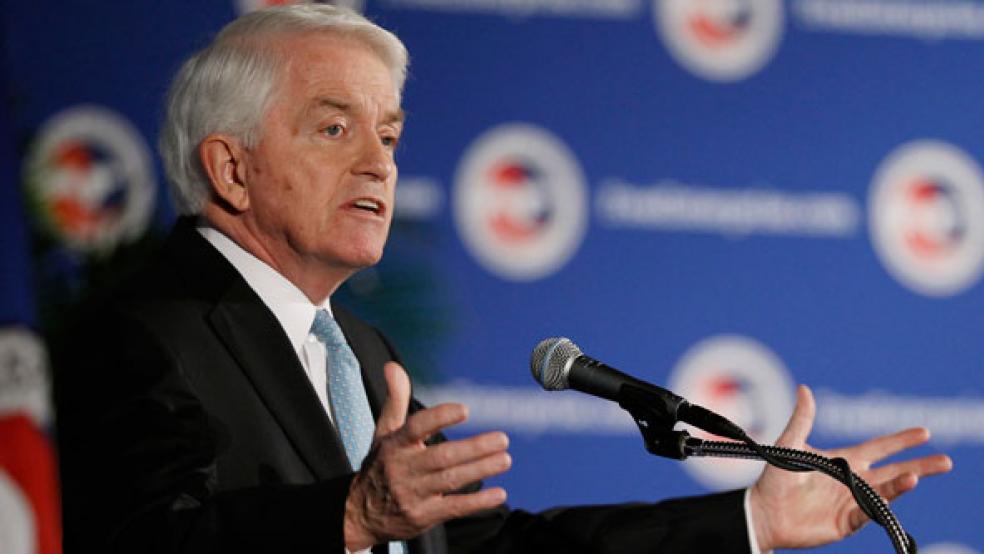The U.S. Chamber of Commerce—one of the dominant forces in GOP politics—sketched out its playbook Thursday for the upcoming fight over the debt ceiling.
The federal government maxed out its $16.4 trillion borrowing authority at the end of 2012, setting into motion a series of extraordinary measures to continue operations for the next two months. Should President Obama and Congress fail to raise the debt ceiling before a March deadline, the government would face an historic default that could ransack the global economy.
After delivering his annual “State of American Business” address, Chamber CEO Tom Donohue encouraged lawmakers to withhold approval of a debt ceiling increase in order to curb entitlement spending—but to not put the nation into default.
“We do believe we should create a certain amount of—I don’t want to call it tension,” Donohue told reporters before arriving at his preferred word—“Focus.”
Not every powerful business lobby is on the Chamber’s side. The Washington Post columnist Greg Sargent said, “The powerful Financial Services Roundtable — which is headed by former GOP presidential candidate Tim Pawlenty and represents nearly 100 of the largest financial service firms in the country — is set to increase pressure on Congress to raise the debt limit, warning that failure to do so will make the markets go “haywire.”
As the leading association that represents corporate interests, the Chamber’s position straddles a thin line. Donohue opposes any default, but he endorsed the risk of default—which Obama has warned would have a cataclysmic impact on markets and presumably Chamber members—to discipline lawmakers. The last debt ceiling increase in 2011 pitted the Chamber against the Tea Party wing of the Republican party that was willing to default.
Congressional Republicans—most notably House Speaker John Boehner and Senate Minority Leader Mitch McConnell—have embraced using the debt ceiling to force Obama to agree to their spending cuts. The GOP is looking for a dollar in reduced expenditures for each dollar increased in the debt threshold. They’ve discussed shifting Medicare, Social Security and other government programs to a less generous metric for inflation known as the chained Consumer Price Index, in addition to raising the eligibility age for Medicare to 67 from 65.
Donohue pooh-poohed such changes as incremental. The government will have to make reasonable changes such as restructuring certain benefits programs and introducing new “modest co-payments” for the taxpayer-funded health insurance.
“People all know this,” Donohue said, saying the current spending is unsustainable and that lawmakers simply lack the “courage” to make these fixes.
Obama has thus far refused to negotiate on the debt ceiling increase, saying that Congress should simply agree to finance the commitments that they’ve already incurred. And Senate and House Democrats have objected to many of the measures floated publicly to curb Medicare costs, unless they involve reducing payments to pharmaceutical companies, a component of Obama’s 2013 budget proposal that would predictably meet resistance from businesses.
The Chamber also talked up the need for tax reform, limiting regulation, changing immigration laws to open up more avenues for residency, and capitalizing on the country’s national gas reserves. But Donohue said that efforts to limit tax deductions and lower rates can only occur after the growth in spending has been slowed.
“We’re not going to do a major comprehensive tax reform until we see some movement on control of spending.”




